Introducing the 36th Cohort of Udall Center Fellows!
This year’s Udall Center Fellows are five U of A faculty members representing six schools and departments.
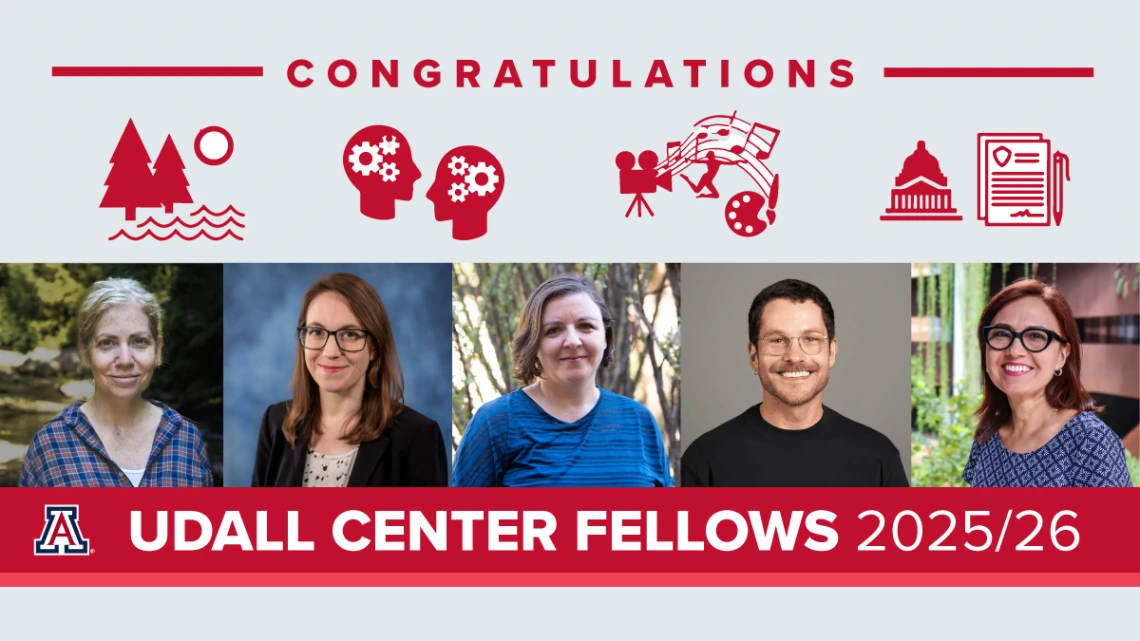
Launched in 1990, the Udall Center for Studies in Public Policy (UC) Fellows Program began as an effort to relieve early career University of Arizona professors of their teaching duties for a semester so they could focus their attention on a research project related to or otherwise potentially impactful to public policy.
Now in its 36th year, the scholars selected to the 2025-26 UC Fellows cohort promise to carry that tradition of outstanding academic inquiry forward. The UC is excited to welcome five new U of A scholars working on a diverse set of public policy research projects to the UC Fellows Program.
The research progress and outputs arising from this opportunity are the result of continued partnerships between the UC and the U of A College of Social and Behavioral Sciences; the College of Fine Arts; the Arizona Institute for Resilience; and the Office of Research, Innovation and Impact.
Read on to learn more about the 2025-26 UC Fellows and the research they will conduct over the course of the upcoming academic year.
Carolyn Barnett
Assistant Professor, School of Government and Public Policy & School of Middle Eastern and North African Studies
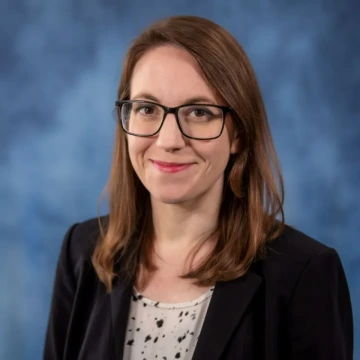
Project Title: Benevolent Gatekeepers: When and Why Men Empower Women
Project Track: General Policy Research, in partnership with the Office of Research, Innovation and Impact
How, when, and why do men support the advancement of their female family members and peers in politics and professional settings in societies where this is not the norm?
This is the central question behind the policy research project that School of Government and Public Policy Assistant Professor Carolyn Barnett will pursue during her time as a UC Fellow.
Barnett’s project focuses on understanding the conditions under which men in patriarchal societies become “benevolent gatekeepers” who actively support the political and economic advancement of women.
Building on her previous work in the Middle East and North Africa region, Barnett aims to investigate how male support shapes women’s opportunities and empowerment at both interpersonal and institutional levels. She notes that, despite progress in education and legal reforms, “women’s labor force participation and political representation have not kept pace” in much of the developing world.
Her project will use a multi-method approach, including interviews, surveys, ethnographic observation, and analysis of existing data to examine both attitudes and behaviors of men toward female relatives’ ambitions. A key goal is to identify pathways for encouraging male support.
Barnett plans to use the fellowship term to begin this research and develop a grant proposal in preparation for a book on gender equality and the dynamics of male allyship in patriarchal contexts with the working title, Benevolent Gatekeepers: When and Why Men Empower Women.
Maria Porter
Assistant Professor, Department of Political Economy and Moral Science, College of Social and Behavioral Sciences
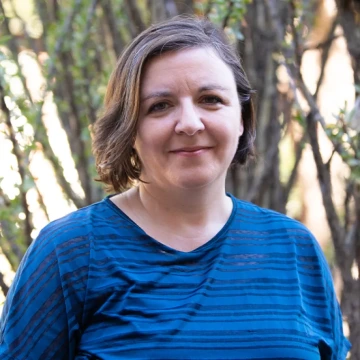
Project Title: Digital innovation for agricultural insurance: a case study in Ethiopia
Project Track: Environmental Policy Research, in partnership with the Arizona Institute for Resilience
Climate change exposes smallholder farmers to production risk. Yet, the supply of reliable indemnity insurance coverage against such weather events remains limited. Thus, smallholder farmers remain vulnerable to extreme weather shocks.
Assistant Professor in the College of Social and Behavioral Sciences Maria Porter studies how index-based insurance programs can be improved to better protect smallholder farmers against agricultural losses. Such indices are often poorly designed, and farmers may pay the insurance premium without receiving a payout when experiencing crop damage (‘downside’ basis risk). One approach to addressing such risk is Picture-Based Insurance (PBI), which uses smartphone images of farmers’ insured crops for claims settlement and risk management advice.
Porter collaborates with researchers at the International Food Policy Research Institute to assess the feasibility and effectiveness of PBI in Ethiopia. To determine whether such an approach is feasible and effective in addressing farmers’ needs, Porter and collaborators developed and implemented a clustered randomized control trial.
As a UC Fellow, Porter will disseminate findings from this study to promote further international collaborations focused on how to effectively scale up PBI. This research project will provide a new solution to ensuring access to more complete insurance mechanisms than what is now available to farmers around the world.
Marcos Serafim
Assistant Professor, School of Art, College of Fine Arts
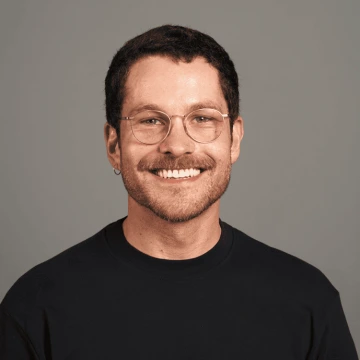
Project Title: SEMIPERMEABLE: Data, The Ongoing HIV/AIDS Crisis, and the U.S.-Mexico Border
Project Track: Fine Arts Public Policy Research, in partnership with Arizona Arts and the College of Fine Arts
During his time as a UC Fellow, Assistant Professor in the College of Fine Arts Marcos Serafim will further develop his fine arts research project titled SEMIPERMEABLE. The project is an interdisciplinary endeavor that merges digital art, data visualization, and documentary strategies to address the HIV/AIDS crisis along the U.S./Mexico border.
SEMIPERMEABLE uses generative computational tools and audiovisual media to explore how structural inequities—particularly those affecting queer-mestiza/o individuals living with HIV—intersect with healthcare access, race, and socioeconomic status.
Serafim and his team have developed an immersive, interactive digital system capable of generating complex visual and audio content in real time, leading to installations, performances, and video essays. Central to the work is the concept of "semi-permeabilities of a set of entangled membranes," referring to physical, social, and informational boundaries that shape the lived experience of HIV in border communities.
Serafim’s artistic methodology challenges traditional scientific paradigms, proposing that “human relationship to data is generally and intensely determined by aesthetics, sensoriality and emotional connection.” The project has already produced multiple artworks and performances and will expand through new dissemination efforts and funding applications during the fellowship period.
Stacey Tecot
Professor, School of Anthropology, College of Social and Behavioral Sciences; Director, Laboratory for the Evolutionary Endocrinology of Primates
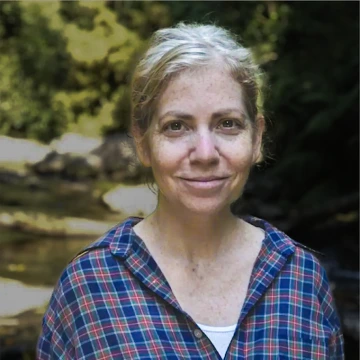
Project Title: Re-assessing the conservation status of threatened species in Madagascar: conservation action planning and storytelling with global partners
Project Track: Environmental Policy Research, in partnership with the Arizona Institute for Resilience
Rooted in over 20 years of research in Madagascar, Associate Professor in the School of Anthropology and Director of the Laboratory for the Evolutionary Endocrinology of Primates Stacey Tecot brings her focus on endangered red-bellied lemurs to the UC Fellows Program.
According to Tecot, this research project focuses on turning deep field knowledge into real conservation impact for these rare primates from Madagascar. Combining science and storytelling, the work aims to create more inclusive, effective species conservation policy.
Tecot’s research follows the International Union for Conservation of Nature’s Assess-Plan-Act model to reassess the lemur’s extinction risk and develop updated Action Plans. Years of on-the-ground data show alarming trends in lemur population decline, raising the urgency of this work.
Tecot says her participation as a UC Fellow will support expanded collaboration with local researchers and conservation groups, help fill data gaps, and organize a second international workshop to move protection efforts forward.
The project also includes a creative angle—interviewing and filming Malagasy research guides to highlight their deep knowledge and connection to the forest. These personal stories, paired with scientific data, aim to broaden public understanding and support for conservation.
Ultimately, this work is about making sure the science doesn’t stay on the pages of academic journals, but serves to shape policy and action that helps both people and wildlife in Madagascar.
Adriana Zuniga-Teran
Associate Professor, School of Geography, Development and Environment

Project Title: Assessing Social and Ecological Outcomes of Public Engagement in Environmental Governance
Project Track: Social Sciences and Public Policy, in partnership with the College of Social and Behavioral Sciences
Over the last 50 years, public engagement in environmental decision-making in the U.S. has shifted from a top-down regulatory approach to more intentional efforts to involve the communities most affected by environmental issues.
It’s often assumed that simply including public voices in the environmental decision-making process helps prevent environmental injustice. But whether such engagement actually leads to better ecological or social outcomes is still unclear.
During her UC Fellowship, Associate Professor in the School of Geography, Development and Environment Adriana Zuniga-Teran will dig into this question by studying the long-running public engagement efforts at the Tucson International Airport Area (TIAA) Superfund Site in Tucson, Arizona. This site, located on the city’s south side, has been home to mostly low-income Hispanic communities and members of the San Xavier District of the Tohono O’odham Nation—groups that have faced serious health and environmental impacts from contaminated drinking water for decades. When the EPA declared it a Superfund site in 1982, they launched cleanup efforts and created the Unified Community Advisory Board (UCAB), a group of local volunteers who regularly meet with agencies to stay informed and share concerns.
Through observing UCAB meetings and interviewing members and agency reps, Zuniga hopes to better understand how engagement has shaped both environmental conditions and community well-being over the last 30 years.
Learn more and find a complete list of previous UC Fellows here.

